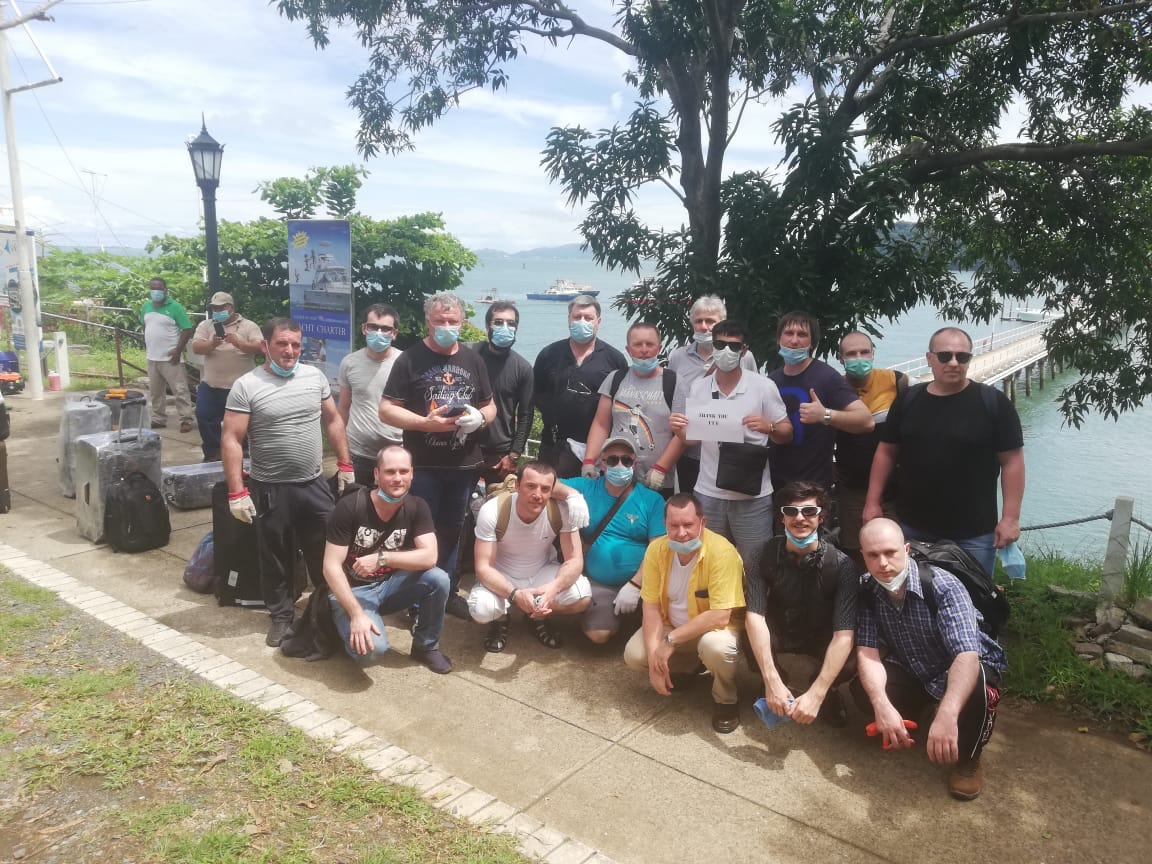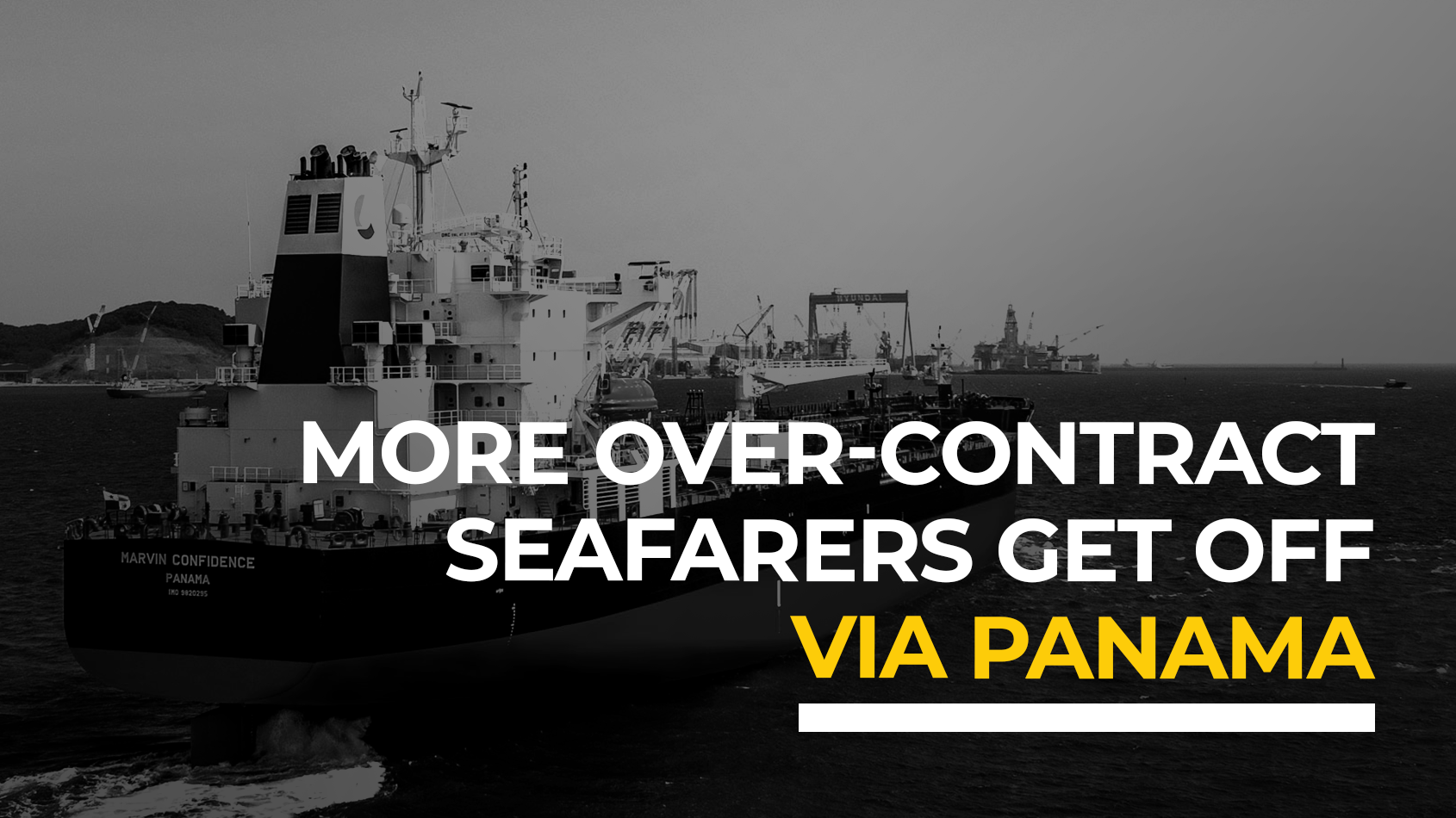
After recent success in helping the crew of the MV Contamines get off their vessel and be repatriated via Panama, the ITF has helped more seafarers get home to their families via the central American country.
The ITF’s Chile-based inspector and Latin America/Caribbean Network Coordinator, Juan Villalón-Jones, and ITF Inspector for Panama Luis Fruto, worked together this week to assist the entire crew of the Panamanian-flagged ‘MV Marvin Confidence’ to get off their ship and begin the journey home.

Some members of the Russian, Ukrainian and Georgian crew had been on board for longer than 10 months. Any further extensions to their contracts would put them, and the ship, in violation of the Maritime Labour Convention’s (MLC) 11-month limit. Under the MLC, seafarers have the right to be repatriated home following completion of their contracts, or to become passengers. In most circumstances, employers cannot compel crew to extend.
The journey home for the crew of the Marvin Confidence first began in late June, when Villalón-Jones was approached by Deacon Paul Rosenblum. Rosenblum is an Apostleship of the Sea Port Minister and Regional Coordinator for North America and the Caribbean. The Deacon wrote to Villalón-Jones, requesting assistance on behalf of the Marvin Confidence’s crew members, as the ship was near Villalón-Jones’s native Chile.
The Deacon explained that not only were many of the crew working on expired contracts on board the Marvin Confidence (which is illegal), but there also seemed to be medical issues with at least one of them, which he thoughts deserved ITF attention. The Marvin Confidence was also lacking critical supplies needed by the crew, and elements of the vessel’s communications were not working, the Deacon said. All of this amounted to a very serious and potentially life-threatening situation for the crew on the ship.
Villalón-Jones explains, “Once I checked the port schedule, I noticed the vessel was at anchored in Valparaiso, Chile, but with no request to dock.”
“I got in touch with the ship’s agent, and they assured me the vessel will receive supply while at anchor. But at that point there was still no request for medical assistance for the crew, and most of the lines of communications were still broken.”
Villalón-Jones made contact with the crew to get more information and to start discussing their options with them.
“The crew member who needed medical attention informed me that he hadn’t requested a medical visit formally through the ship’s master, which is needed. So, I guided him in how to do it. I also explained to him that when it comes to repatriations in the current climate, the process was not a simple one.”
Under the global rules that govern seafarers’ employment and rights, the MLC, seafarers need to formally request repatriation from their ship at least two weeks in advance, through the master of the vessel.
“I told him the difficulties we are experiencing now with the crew change crisis. If a formal request for repatriation is made in line with the MLC, and is denied by the ship’s master or manning company, then we or Port State Control can enter the vessel. But crew need to bear in mind that these things take even longer due to Covid-19 restrictions and repatriation will depend on the availability of flights worldwide,” said Villalón-Jones.
“When we spoke to the seafarer with the medical condition, we asked him what had been happening, how he felt, and how long he had been on board. He told us he has been over ten months on board, had signed two contract extensions already and he desperately wanted to go home.”
Villalón-Jones then contacted the ship’s company and requested repatriation for the seafarer. He said even though the company was “quite friendly” in their response, like other firms caught in the middle of the crew change crisis, they claimed they didn’t have enough time to comply with the complicated Chilean protocols required for crew changes before the ship was due to leave port, continuing its run north.
Reflecting on the response, Villalón-Jones says, “If companies like this one took their responsibilities around crew change seriously, then they could have asked for the necessary information on Chile’s protocols well in advance and have been prepared to get their crew refreshed in a timely way.”
“The fact is that crew changes can be performed in Chile following a sanitary protocol. We have flights to and from important hubs in Europe and Asia via Miami or Sao Paulo,” said Villalón-Jones.
“Considering the company didn’t take this proactive approach and it seemed the unwell seafarer needed to get off fairly urgently, we helped them to see they could at least perform the crew change in Panama in a few days’ time. As the ITF, we are there to help companies be successful with crew change – our focus is all about the welfare of seafarers.”
Villalón-Jones says once the rest of the crew learned that repatriation in Panama was planned for some on board, others put up their hand to get off there.
Utilising the ITF’s network of dozens of inspectors worldwide, Villalón-Jones contacted his colleague Luis Fruto in Panama.
“I said to him: we haven’t been able to get these seafarers off the Marvin Confidence in Chile, but there is still hope they can disembark in Panama and be relieved by fresh crew. Can we make it happen?” said Villalón-Jones.
Fruto had recent success with a number of crew changes via his native Panama, and Villalón-Jones had faith that Fruto would find success once more.
The vessel began to make its way to Panama on course for a 23 July berthing. The company kept the ITF informed of their work with an agent there to assist with the repatriation. While things had looked promising at first, the company now started to make excuses and alternative plans. They said that in the event that a crew change was not possible in Panama, the crew would be returned to Chile. There, they said, crew changes would take place in the Chilean port of Lirquen.
The reaction on board was not good. Why was the company now talking about deferring crew change yet again? Why were they not organised yet again? Would this go on forever?
After months at sea beyond their initial contracts, missing their loved ones and desperate to get home – the Marvin Confidence’s crew began to consider stronger action to enforce their right to get off.
Bad news also came the way of the unwell seafarer. He was told he was not ‘unfit for duty’, and therefore could not be considered for repatriation alongside most of the crew. After 10 months at sea already, he was distraught.
Finally, on August 11, the vessel arrived in Panama. The 11 crew members, keen to avoid another extension to Chile against their will, decided to send a letter to the Panamanian Maritime Authority stating that if crew changes were not done immediately, they would refuse to work – and the ship would stop moving.
Among the crew to stand up and draw a line in the sand were the master, chief officer, second officer, chief engineer, third engineer, electrical engineer, the bosun, the fitter and the chief cook.
Inspector Luis Fruto explains, “This was a crew who had had enough. They completed their initial contracts, then they were persuaded to extend and extend by their employer. But here they were on a Panamanian-flagged ship, in Panama, and asking to finally go home.”
“It is the responsibility of the ship’s company and their agents to prepare for crew change – Covid protocols are no excuse not to be organised. In this situation it is not the crew’s fault – so why must they pay the price of an extension?”
Finally, on August 14, 2020, Fruto received a call from the AMP Seafarers Director, informing him that all of the Marvin Confidence’s crew had received tickets to go home, including the unwell seafarer. Fruto met them at the airport and wished them well. They thanked the ITF inspector and his colleagues for the help and support.
“It was great to see the smiles on their faces after such an uncertain, stressful time,” said Fruto.
“The lesson from these crew change stories is simple: when seafarers stand up for their rights to get off a ship following their contracts and be repatriated – the ITF will stand with them. Crew change is possible in countries like Panama – but seafarers have to be willing to take the opportunity.”
With more seafarers refusing to extend and enforcing their right to stop working upon completion of their contracts, the ITF believes the crew change crisis has the potential to start disrupting international trade.
